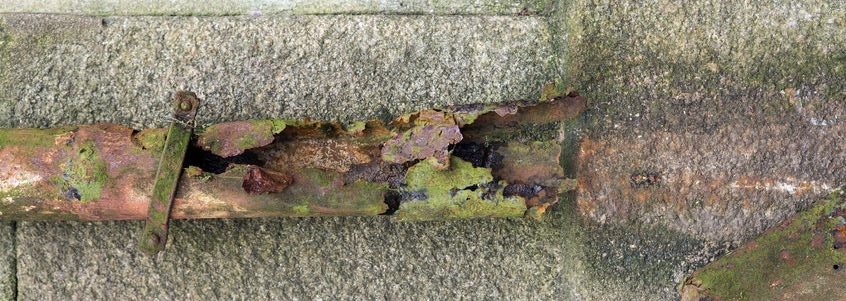The best way to prevent gutter damage is regular cleanings. This is more important than any other tip. There are still other methods, but keeping your gutters clean and clear of debris stops any problems before they start.
Hail
How to Prevent Damage
- Install a heavy-duty gutter such as copper or galvalume
- Before hail season (March–October), inspect brackets and replace them if needed
- Nail down any loose shingles on your roof
The best method of prevention for hail is thick metallic gutters. The thickness will prevent the hail from puncturing the gutter. Weigh the cost of the gutter versus frequency of hail storms. Hail storms in Texas can be few and far between. It may be more affordable to do simple inspections before and after hail storms.
Snow
How to Prevent Damage
- Invest in a gutter de-icing system
- Insulate your attic to keep snow as powder
- Make sure gutters are reinforced to bear the weight of the ice
It’s dangerous for ice to melt on your roof, flow down to your gutters, and freeze while inside. This expands the gutters, causing them to crack over time and break off of your home. To prevent this, make sure your home has proper insulation in the attic. The insulation will keep warm air in the home and keep any snow on top of the house where it belongs. Also, a de-icing system can melt the ice and keep it flowing to the downspouts. While snow and ice are rare in Texas, the Lone Star State is not well known for its predictable weather.
Water
How to Prevent Damage
- Layer your gutters with water-resistant paint to prevent cracking
- Seal up any breaks in seamed gutters
- Clear out trees to let sunlight be exposed to the gutters
Water should flow through gutters. However, gutters are not immune to its damaging capacity. Standing water can affect the structural integrity. This can crack the molding and lead to home damage. Direct sunlight speeds up evaporation, leading to drier gutters faster. Also, gutter paint that resists moisture can greatly help.
Foundation
How to Prevent Damage
- Point downspout away from house on downward slope
- Direct the flow of water through dirt and cement trenches
- Conduct a yearly inspection of the ground before periods of major precipitation
If too much precipitation pours out of gutters, your foundation can erode and crack. Gutters must be maintained by inspecting cracks and brackets. Also, your downspout must direct precipitation down and away from the home. The less water on the ground, the stronger the structure.
Clogged
How to Prevent Damage
- Place gutter guards over the top to let rain in and keep leaves and other debris out
- Clean monthly during wet or severe weather months
- Inspect weekly during bad weather months
Some debris will flow through a gutter just fine. When it doesn’t, the debris impacts on itself. The pressure from any flowing water compresses it together. The debris gets clogged, which increases the pressure on the gutter over time. The pressure will cause any precipitation to go over the side or force the gutter to expand. Placing guards during a routine cleaning should help you throughout the year.
Overflowing
How to Prevent Damage
- Inspect the inside of the gutter for debris
- Analyze the direction of the gutter and if it makes any unusual turns
- Look at the pitch of the roof and see if it can be adjusted
If your gutters are overflowing, you may be victim to too much rain or shoddy workmanship. In either case, the best prevention is good gutter engineering. The water should be flowing evenly to the gutter on all sides.
Does insurance cover gutter damage?
Yes. Unless your policy says otherwise, your insurance covers any damage caused by bad weather. If you have a mortgage on your home, it is in the lender’s interest that the home be kept intact for financial purposes. They will make sure your homeowner’s insurance covers it.
Insurance could refuse to cover gutter damage on several conditions:
- Proper maintenance was not performed
- The incident happened after a crack was reported, but was not patched
- Damage was caused by rust
Insurance companies may prevent coverage by certain weather conditions. For instance, severe wind in the Great Plains may not be a good reason to submit a claim, as they are subject to violent winds every year.
Want to learn more?
Contact a gutter professional about more tips about other important services such as a gutter guard. Contact us now to get your free estimate on a new gutter system!







